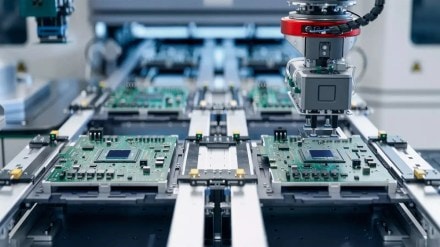The electronics components manufacturing scheme on Monday received another push as seven projects worth Rs 5,532 crore were cleared, marking a strong industry-led response to the government’s drive to localise the production of critical inputs. The approvals include four projects from the Kaynes Group and one each from Syrma Group, Ascent Circuits of Amber Group, and SRF.
The approved projects are expected to collectively generate employment for 5,195 people and help reduce the electronics import bill by around Rs 20,000 crore, Electronics and IT Minister, Ashwini Vaishnaw said.
Vaishnaw said that the approved projects will cater to a significant share of domestic demand — 27% for PCBs, 15% for camera modules, and full self-reliance for copper laminates and polypropylene films.
He said that the investments span high-value areas such as multi-layer printed circuit boards (PCBs), high-density interconnect (HDI) PCBs, camera modules, copper laminates, and polypropylene films — components that form the backbone of modern electronics, from smartphones and laptops to consumer appliances and industrial systems.
The Kaynes Group has emerged as the largest investor among the approved applicants, with four projects worth Rs 3,280 crore. These include facilities for manufacturing multi-layer PCBs, camera module sub-assemblies, and HDI PCBs. The combined production potential from these units is estimated at over Rs 23,800 crore. Kaynes’ upcoming plant will mark the first instance of camera modules being produced in the country without the involvement of a foreign technology partner.
The Amber Group’s Ascent Circuits has secured approval for a Rs 991-crore investment aimed at manufacturing multi-layer PCBs valued at Rs 7,847 crore, while Syrma Strategic Electronics will invest Rs 765 crore to produce PCBs worth Rs 6,933 crore. Specialty chemicals major SRF will enter the electronic materials segment with a Rs 496-crore project to produce polypropylene films used in capacitors, targeting domestic demand currently met through imports.
The ECMS, announced in March with an outlay of Rs 22,919 crore, aims to catalyse domestic production of critical components such as PCBs, semiconductor packaging, camera and display sub-assemblies, and lithium-ion battery cells over a six-year horizon. The scheme has received investment proposals worth Rs 1.15 lakh crore. “Against an initial investment target of Rs 59,350 crore, we received commitments worth nearly double that,” Electronics and IT Secretary, S Krishnan said.
The first phase of the scheme closed on September 30, while the window for capital equipment continues to remain open.
Officials expect more approvals in the coming months, potentially expanding the country’s electronic components base and doubling electronics exports within four years.
